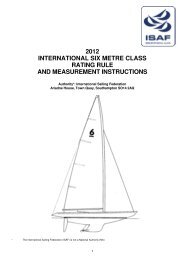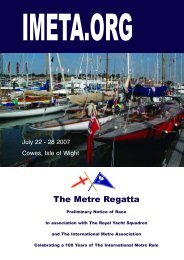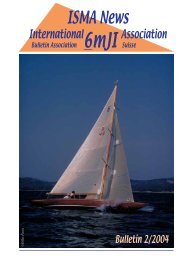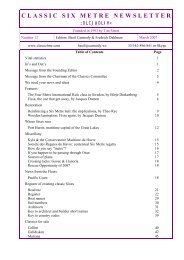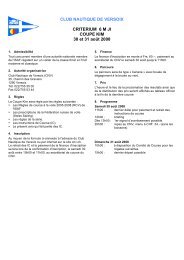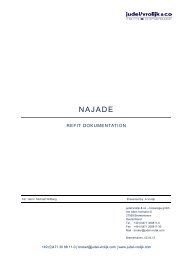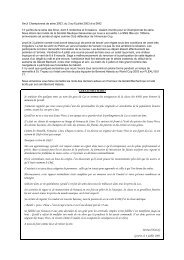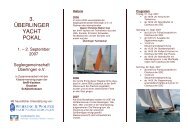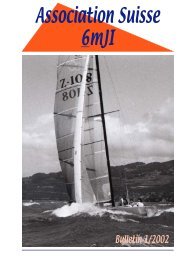ISMA News - Association Suisse 6mJI
ISMA News - Association Suisse 6mJI
ISMA News - Association Suisse 6mJI
Create successful ePaper yourself
Turn your PDF publications into a flip-book with our unique Google optimized e-Paper software.
<strong>ISMA</strong> <strong>News</strong> International <strong>6mJI</strong> <strong>Association</strong> Bulletin 1/2007 7<br />
Background<br />
For several years the <strong>Association</strong> has struggled to achieve a level of income which would allow it to fund its activities<br />
properly. A summary of income and expenditure for the years 2004 – 2006 is attached as Annex A. <strong>ISMA</strong><br />
has been able to meet its obligation to pay a subscription to ISAF. However it is clear that the <strong>ISMA</strong> Journal and<br />
website together absorb all the <strong>Association</strong>’s remaining income, and this may still be inadequate to meet these<br />
costs (see <strong>ISMA</strong> Journal 2/2005 pp 8 – 10). Thus the <strong>ISMA</strong> Journal and website only survive thanks to the goodwill<br />
of the editor.<br />
The lack of funding is a matter of serious concern. There is no spare capacity for meeting the costs of other activities<br />
which the <strong>Association</strong> might wish to undertake, such as:<br />
• meeting the running expenses (stationery, postage, telephone) of the <strong>Association</strong>’s officers<br />
• insuring the trophies<br />
• paying membership fees to other bodies<br />
• funding the purchase of new trophies<br />
• subsidising activities to facilitate the racing and social programme<br />
• funding other forms of publicity<br />
• paying meeting expenses (such as hire costs for meeting venues)<br />
establishing a contingency fund.<br />
Current Funding Arrangements<br />
Historically, <strong>ISMA</strong> has derived its income by charging a fee for each boat, collected wherever possible through<br />
National <strong>Association</strong>s. There have been two particular problems:<br />
From a comparison of fees paid by each national fleet, compared with the number of boats which feature in race<br />
results from those countries, it has become clear that some national fleets have many more boats actively competing<br />
in six metre races, both nationally and internationally, than are paying subscriptions.<br />
A number of people have expressed an interest in the class, and some actually own boats which are laid up or undergoing<br />
restoration. They have sought advice from <strong>ISMA</strong>, and the <strong>Association</strong>’s officers have expended significant<br />
time and effort, and some expense, in corresponding with them and answering their questions. Many of these<br />
people have been added to the circulation list for the <strong>ISMA</strong> journal, and others may wish to be on the list. However<br />
because <strong>ISMA</strong> fees have, in theory, been related to boats, there has been no attempt to derive an income from such<br />
people to offset the administrative cost of keeping in touch with them and sending them the journal. Some former<br />
boat owners also remain on the circulation list despite no longer paying a subscription.<br />
In an attempt to generate more income, the <strong>Association</strong> introduced a requirement for sail certification marks on<br />
all sails measured after 1 March 2005. This has proved only partially successful. It is only effectively policed at<br />
major events, and derives no income from boats which use second-hand sails.<br />
Proposals for Alternative Funding<br />
Clearly the <strong>Association</strong> needs to spread its net wider in the search for funds. This could be achieved to some<br />
degree by more effective monitoring of which boats appear in active competition. The recent initiative to collect<br />
more accurate records of each national fleet will assist in this respect. However, it is the responsibility of each<br />
National <strong>Association</strong> to control the situation in its own waters. In this regard it is perhaps relevant to note that the<br />
<strong>ISMA</strong> by-laws permit attendance and voting at General Meetings by National <strong>Association</strong>s ‘in good standing’.<br />
What comprises ‘good standing’ is nowhere defined, but it might be argued that a National <strong>Association</strong> which fails<br />
to collect dues from competing boats should automatically forfeit its ‘good standing’. This would mean that its<br />
members would be unable to compete in international events, and it would be unable to vote in meetings or host<br />
events itself.



